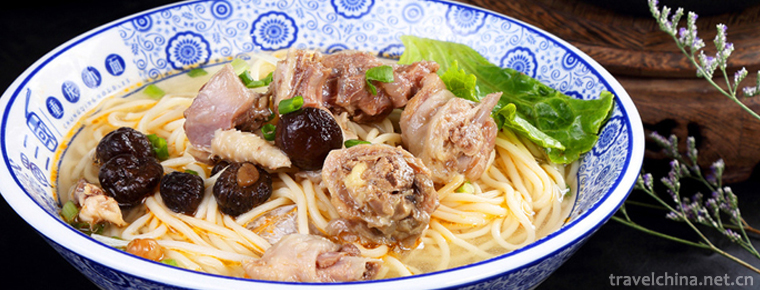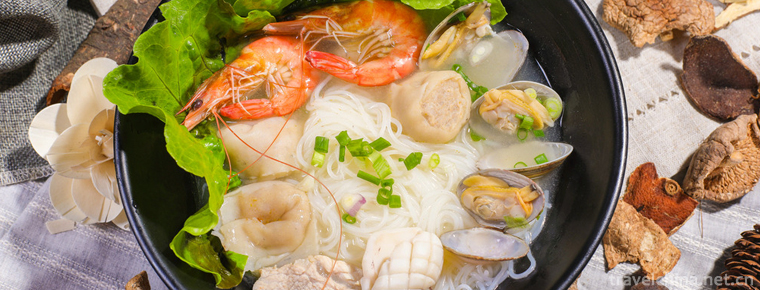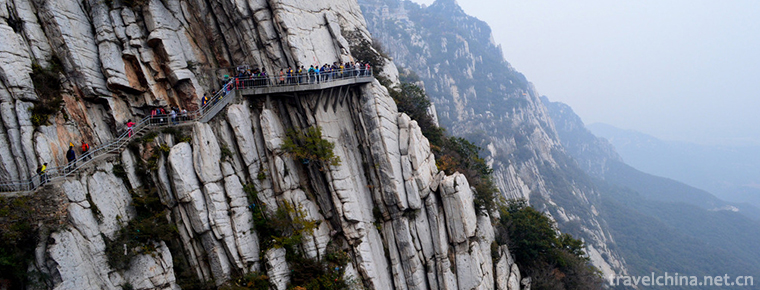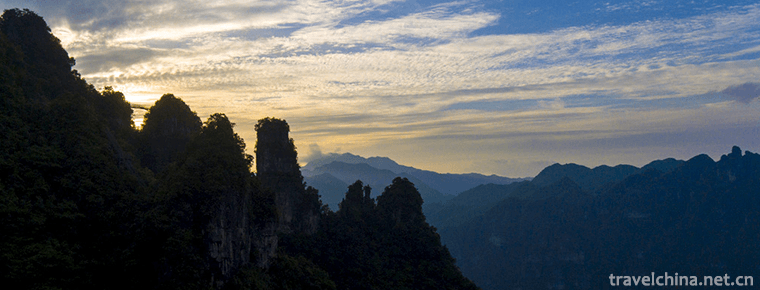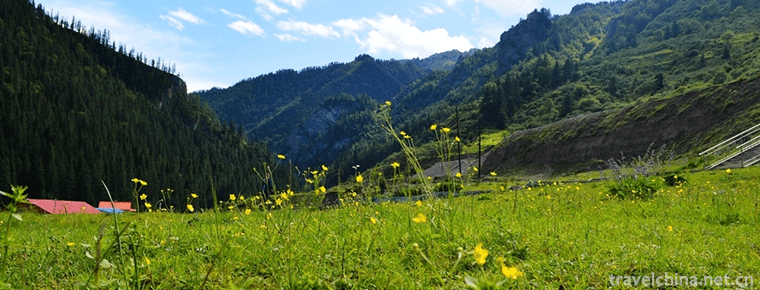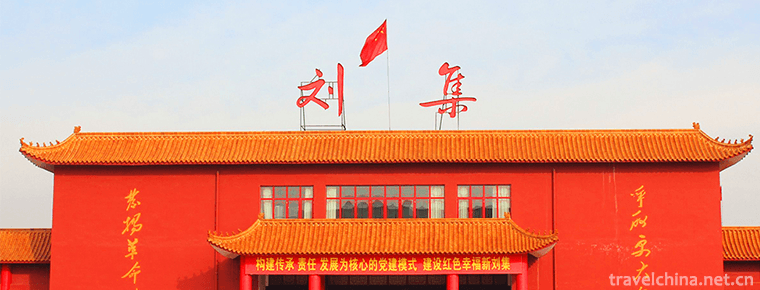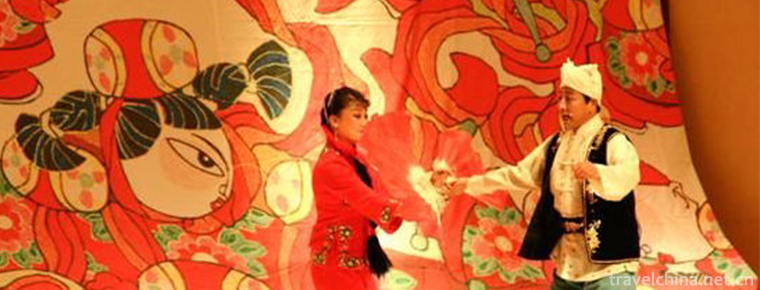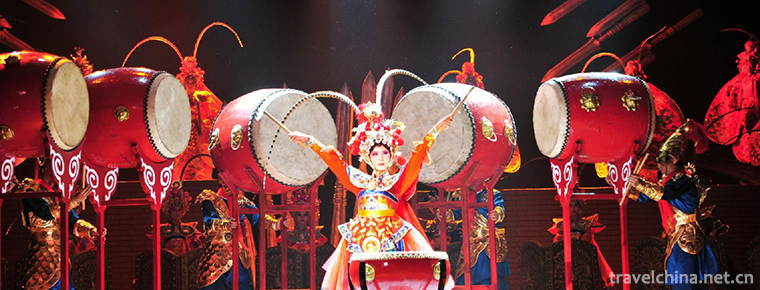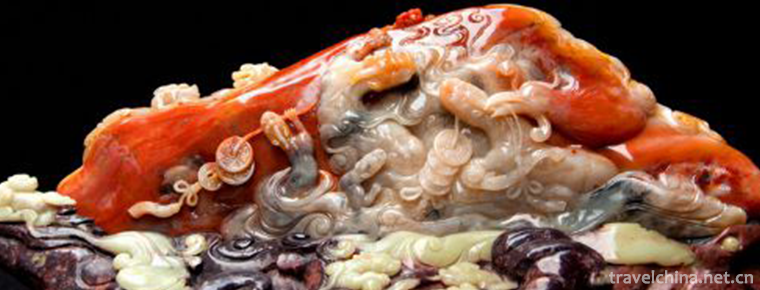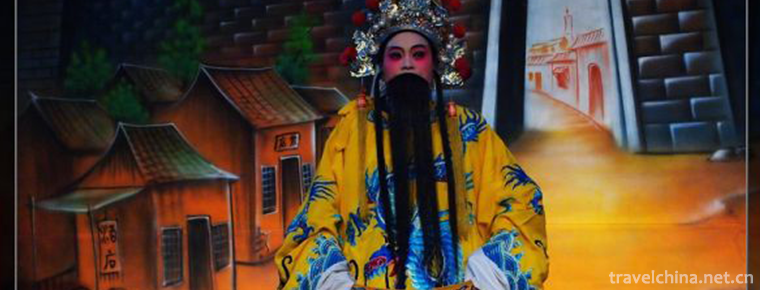Jinghe Opera
Jinghe Opera
Jinghe Opera, a local traditional drama in Lixian County, Hunan Province, is one of the national intangible cultural heritage.
Jinghe Opera was named for its popularity in the Jinghe Reach of the Yangtze River. Historically, it had the names of Shanghe Road, Grand Band and Grand Tai Opera. It was formally named Jinghe Opera in 1954. Jinghe Opera began in Yongle Period of early Ming Dynasty. By early Qing Dynasty, it had basically completed the "north-south combination" of Chu Opera and Qin Opera, formed the "north-south road" of Jinghe Opera and basically formed Jinghe Opera. Jinghe Opera has more than 500 repertoires. The stage language is mainly spoken Jingzhou or Lizhou Mandarin. The singing voice is high, loud and magnificent. The music blends north and south. The lyrics and Taobai are popular and charming.
On May 20, 2006, Jinghe Opera was approved by the State Council of the People's Republic of China and listed in the first batch of national intangible cultural heritage catalogues, numbered IV-35.
historical origin
Jinghe Opera originated from Yongle Period in the early Ming Dynasty. In the second year of Yongle (1404), Jinghe Opera has been performed in Shashi City, Hubei Province, which is called "Chu Diao".
In the first year of Hongxi (1425), Wang Fengfan of Huayang came to Lizhou, accompanied by private theatres, with dozens of musicians and a large number of scripts, often performing in Huayang House.
In the forty-third year of Wanli (1615), Yuan Zhongdao watched the performance of Jinchai in Chu Diao.
At the end of Ming Dynasty and the beginning of Qing Dynasty, the Qin Opera Troupe came to Lizhou with Li Zicheng, and the artists scattered everywhere. By the beginning of Qing Dynasty, the "north-south combination" of Chu Opera and Qin Opera was basically completed, and the "north-south road" of Jinghe Opera was formed.
In the forty-second year of Kangxi (1703), Gu Cai mentioned "the final tone of Chu" in "Rongmei Jiyou", which refers to Jinghe Opera which was popular in Lishui area at that time.
During the period of Weifeng and Tongzhi in the Qing Dynasty (1851-1874), there were more than 20 class clubs engaged in professional performances, such as Santai, Sanyuan, Taishou, Culture, Tongyue, Longevity and Tongfu, in Lizhou, Hunan Province and Changsha City, Hubei Province, which were the activity centers of Jinghe Opera. From the late Qing Dynasty to the Revolution of 1911, more than 30 classes were established successively, which was the flourishing period of Jinghe Opera.
During the 36 years from Xianfeng to the Republic of China (1947), 67 well-known Jinghe Opera Classes were founded and 52 were set up. In the early stage of Jinghe Opera, temple opera, convention opera and grass stage opera were the main forms.
After the Revolution of 1911, theatres were built in some towns, but most of them were still singing in the countryside for a long time, except for a few Jinghe opera troupes.
After the outbreak of the War of Resistance Against Japan, Jinghe Opera was greatly affected and devastated. According to incomplete statistics, on the eve of liberation, there were only five opera troupes in Jinghe Opera: Yongle, Yiwu, Songxiu, Tongle and Xinhua. Jinghe Opera was called Chu Opera, Han Opera and Hunan Opera during the Anti-Japanese War.
In 1954, the Hunan Provincial Department of Culture arranged for the provincial folk professional theatre troupe to be officially named Jinghe Opera.
Cultural characteristics
Form of performance
Jinghe Opera has a set of performing forms and basic skills in all walks of life. Such as walking: more square steps for raw horns, more eight-word steps for faces, more arrogant steps for danjiao, more hopping for clowns, rich and old, poor and small square steps. Station: Raw horn, flower face, feet are small octagonal, body face is facing one side, chest and abdomen stand "block monument"; Danjiao feet are T-shaped, body side stand "wind swing willow"; clown wearing jacket, twist body stand "monkey holding pile". Sitting: The eyelids should be high (with cushion packs on the chair), the raw horns should be stable (on the end of the chair), and the Dan horns should be empty (on the side of the small half of the chair). Raise your hand "Kaishan character": Flower face over, angular eyebrows, Xiaosheng, clown shoulder flat, danjiao chest flat. Use finger: Tiger claw for flower face, dragon claw for horn, chrysanthemum or orchid finger for danjiao.
The performance of Jinghe Opera pays attention to eight pieces of Kungfu both inside and outside. "Inner eight pieces" refers to the inner feelings of the characters, such as joy, anger, sadness, joy, surprise, suspicion, dementia and drunkenness, while "outer eight pieces" refers to eight kinds of external body movements, such as cloud hand, standing gear, kicking, waist, horse slicing, arrow stride, crotch swing and lower disc. Jinghe Opera is famous for its martial arts, especially for its various postures of "fighting horses" and "shaking shells".
Performing props
There are also differences in the props used in Jinghe Opera. For example, using fans: large folding fans for flower faces, large opening and closing, mostly Fanning at the head; small folding fans for young students, light opening and closing slowly, can not pass the shoulder when fans; danjiao fans (later feather folding fans), generally not Fanning at will. With the whip: the flower face waved back and forth, the living horns were swinging around, and the danjiao was stirred gently and stirred up slightly. In addition, Jinghe opera artists also have the so-called "face heavy shelf, horn heavy step, baby heavy legs, danjiao heavy waist, clown heavy mouth and face of the'shell'(face), horn's' beard', Xiaosheng's'Ling', danjiao's' grab','clown's'dwarf', which are the basic characteristics of all walks of performance.
Accompaniment instrument
The accompaniment instruments of Jinghe Opera mainly consist of two scenes of culture and martial arts. Literary scenes include Huqin, Yueqin, Sanxian, Suona, flute and so on. Military scenes include tanggu, gongs, gongs, horse gongs, cloud gongs, cymbals, cymbals and hinges. The traditional way of playing a gong is very special. It is to throw the Gong into the air and fight again.
Singing features
The stage language of Jinghe Opera is mainly spoken Jingzhou or Lizhou Mandarin. The singing voice is high, loud and magnificent. The artists have trained their special high voice through long-term "grass stage" performances. The singing style varies according to different professions, so it is necessary to use "side voice" and "sandy voice" more frequently. Xiaosheng and Danjiao use "false voice", Huafa often uses "original band edge", Xiaohua Face and Lao Dan use "original voice". A few operas use local dialects such as Sichuan, Shaanxi, Su and Shanxi to pronounce Bai. But a few operas, such as Sanyuan Hui and Sanshoufu, have to imitate Shandong and Suzhou pronunciations, such as "people" pronouncing "Lin" and "Bai" pronouncing "Bai" and so on.
Role play
The roles of Jinghe Opera are divided into six lines: Sheng Sheng, Xiao Sheng, Dan, Lao Dan, Huafa and Ugly. There are four kinds of flower faces: old, miscellaneous, normal and red. Once they are divided into five kinds: Zhengdan, Boudoir Dan, Huadan, Wudan and Shadan. Then they are divided into three kinds: big face, hairy face and bully face.
Shengxing mainly plays the male role of hanging a beard but not opening one's face. It is divided into old students, miscellaneous students, normal students and red students. Xiaosheng, a handsome young man with no beard, can be divided into six categories according to the wear of characters: purple and gold crown play, Erlongfork play, scarf play, veil and hat play, male scarf play and Luo Hat play. Danjiao is divided into five types: Zhengdan, Boudoir Dance, Huadan, Wudan and Shadan. Lao Dan, as an old woman, is divided into rich and poor. The poor use bamboo sticks and the rich use leading crutches. Facial face, divided into big face, hairy face and bully face. Big face plays a prominent and older role; furry face, refers to the second-ranking face in the play; bully face, mostly young, rigid personality, brave, irascible and other roles. Clowns, that is, florid faces, play a wide road, from the imperial generals and princes and young masters, down to hooligans and robbers, courtyard officials, knight-errants, woodcutter shepherds, flower matchmaker and so on can play.
Makeup features
In Jinghe Opera, the raw horns and old dans only need to fill their eyebrows with black or white, not with powder; the Dan horns need to fill their eyebrows with pink and red; the faces and clowns need to sketch their faces. Facial makeup can be divided into six categories: pink face, miscellaneous face and three tiled face. Clown's face can be divided into old face, tofu dry face, peach face, baby face, rotten face and so on. In addition, there are red and raw face. When sketching a face, use red, black and white as background colors. The basic character characteristics of a character are often expressed in color. Loyal and brave chivalrous people have red faces, such as Guan Yunchang; upright and selfless people have black faces, such as Bao Wenzheng; treacherous and evil people have white faces, such as Qin Huan and Yan Song.
Representative repertoire
There are more than 500 traditional operas in Jinghe Opera, including more than 450 of the whole opera and more than 60 of the scattered operas. These dramas are based on Yuan and Ming drama legends, chapter novels and folk stories. The representative dramas include Baizitu, Chu Palace Fuqin, Great Hui Jingzhou, Shuangjuma, Beach Club, Cuiping Mountain, Anti-Wuke, Qin Xuemei, Sanniang Godson, A Handful of Snow and Four Lowers of Henan.
Distribution area
Jinghe Opera is popular in Lixian, Linli, Shimen, Cili, Anxiang, Jin, Yueyang, Huarong, Yuanjiang, Nanxian, Longshan, Yongshun, Sangzhi, Dayong and Songzi, Jiangling, Public Security, Shitou, Jianli, Yichang, Dangyang, Zhijiang, Changyang, Yidu, Hefeng, Yien, Tongren in Guizhou, Xiushan and Youyang in Sichuan Province.
Inheritance and protection
Inheritance value
The study of the rise and fall of Jinghe Opera reveals the relationship between the art of opera and the development of social economy, folk customs, people's psychological and cultural needs, and the recognition of social ethical and moral standards, which has a very positive social significance and humanistic value.
Jinghe Opera has been accumulated by Jinghe artists for a long time. Its repertoire, vocal tune and musical performance are rich and colorful. It has a strong ornamental quality. Therefore, Jinghe Opera also has a high artistic value.
The story of Jinghe Opera is fluent in narration, delicate in characterization, accurate and vivid in Tao Bai and wonderful in lyrics. It has high literary value.
Studying the tunes, cards, Gong and drum scriptures, the use of musical instruments, playing skills, etc. of Jinghe Opera, and deciphering the codes in the music melody, play an important role in interpreting the development and evolution of opera music and tunes.
Jinghe Opera in Lizhou has a long history. There are still a large number of primitive opera cards, hall music, percussion music and so on. It is of great academic research value in linguistics, folklore and the history of national music.
Inheritance status
For various reasons, four of Hunan's five Jinghe Opera Troupes have been disbanded or disintegrated, leaving only one Lixian Jinghe Opera Troupe still struggling to support. Under this situation, it is urgent to rescue and protect Jinghe Opera.
Inheriting characters
Zhang Youjun, male, was born in February 1938 in Changde, Hunan Province. On February 15, 2008, Zhang Youjun was selected as the representative successor of the second batch of national intangible cultural heritage projects and declared in Lixian County, Hunan Province. Project Name: Jinghe Opera.
Xiao Yaoting, male, was born on October 21, 1935 in Linli, Hunan Province. On February 15, 2008, Xiao Yaoting was selected as the representative successor of the second batch of national intangible cultural heritage projects and declared in Lixian County, Hunan Province. Project Name: Jinghe Opera.
protective measures
In July 1979, Changde Drama School set up Jinghe Opera Department, which recruited 35 male and female students to ensure that the inheritance of Jinghe Opera was not interrupted.
From March 1962 to July 1963, the Changde Commissioner's Office established the Jinghe Opera Heritage Excavation and Inheritance Committee, which excavated and recorded 278 traditional scripts of Jinghe Opera, as well as all the tune music and part of the music of Qupai, and made copies separately.
In May 1982, Hunan Provincial Bureau of Culture held teaching performances of Changde Han Opera and Jinghe Opera in Changde, organized 120 young actors from four Jinghe Opera Troupes in the province, learned traditional performing arts from the old artists, and selected 9 plays such as Drunken Return, Daba and Anti-Wuke from 24 plays that took part in teaching performances, and videotaped them.
social influence
Important activities
On September 6, 2012, in commemoration of the 99th anniversary of Jiang Yiwu's inauguration, the large-scale Jinghe opera Jiang Yiwu held its first performance in Lixian County, Hunan Province.
On March 25, 2014, the inaugural meeting and special performance activities of Jinghe Opera Association of Lizhou were held in Lixian Yiwu Theater.
In June 2018, the first Jingchu Cultural Tourism Festival was held in Kaile Grand Theater, in which Jinghe Opera "Great Hui Jingzhou" was displayed.
Honorary commendation
In June 2018, Jinghe Opera "Great Return to Jingzhou" won the "Stage Art Award" of the first Jingchu Cultural Tourism Festival.

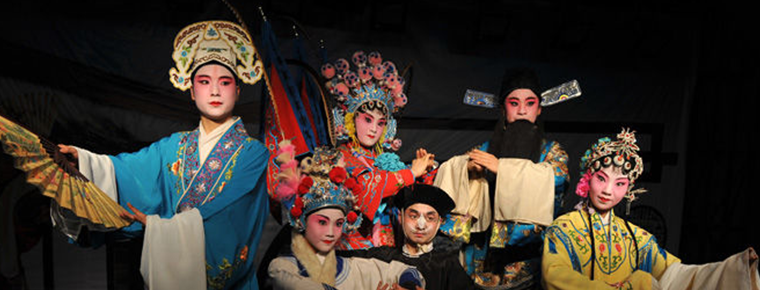
-
Letinous edodes chicken Noodles
Letinous edodes stewed chicken originated in Northern Jiangsu.
Views: 146 Time 2018-10-12 -
Mount Song
Songshan, known as the "foreign side" in ancient times, Xia and Shang Dynasties as "lofty" and "Chongshan", Western Zhou Dynasty as "Yue Shan", Songshan as the .
Views: 186 Time 2018-10-30 -
Chaibuxi Canyon Scenic Area
Chaibuxi Canyon Scenic Area is located in the eastern part of Wufeng Tujia Autonomous County, with Wulingyuan in the South and Qingjiang River in the north. Zhangjiajie belongs to Wuling Mountains..
Views: 216 Time 2019-01-04 -
Dayugou Scenic Area
Dayugou Scenic Area is located in Dayugou, Muer Township, Zhuoni County, Gannan Tibetan Autonomous Prefecture. It is 12 kilometers away from the county seat and has a total area of 105214.6 hectares..
Views: 164 Time 2019-01-07 -
Red Liuji Scenic Area
The Red Liuji Scenic Area is located in Liuji Village, Dawang Town. In 1976, the old site of Liuji Branch of the Communist Party of China was declared as a key cultural relic protection unit at the co.
Views: 157 Time 2019-01-16 -
Hequ folk songs
Hequ folk song is a kind of traditional folk music. Shanxi's human geographical environment has formed the "Xikou" mode of life and production in which local people return to Daqingshan and .
Views: 401 Time 2019-05-03 -
Bangkok in Puzhou
Bangzi of Puzhou is named for its origin in ancient Puzhou. Jinzhong and Northern Shanxi are called "Bangzi on the South Road" or "Bangzi Opera on the South Road", Shangdang is cal.
Views: 118 Time 2019-06-09 -
Qingtian Stone Carving
Qingtian stone carving originated in the period of "Kanze Culture" 5000 years ago. During the Tang and Song Dynasties, there were breakthroughs in creative themes and techniques. During the .
Views: 132 Time 2019-06-11 -
Wuju Opera
Wu Opera, commonly known as Jinhua Opera, is one of the local operas in Zhejiang Province. It centers on Jinhua area and is popular in Jinhua, Lishui, Linhai, Jiande, Chun'an, Yushan, Shangrao, Guixi,.
Views: 220 Time 2019-06-30 -
Qixian Lake
Qixian lake water resort is located in Fuxing Town, Gaoxian County, more than 40 kilometers away from Yibin City. It is the largest mountain water storage Lake in Yibin City, with a water area of 2632 Mu and a total area of more than 50 square kilometers. It was listed as a regional scenic spot in 1988 and approved as the first batch of provincial wetland park by Sichuan Provincial People's Government in 2008..
Views: 371 Time 2020-10-16 -
Xiaoxiangling scenic spot
The synonym Xiaoxiangling generally refers to Xiaoxiangling scenic spot.
Views: 158 Time 2020-10-16
